A happy place, a sanctuary: Singapore's libraries through the eyes of volunteers who love them
These three individuals dedicated themselves to libraries at different stages of their lives, and are now contributing in their own ways to the learning "ecosystem".
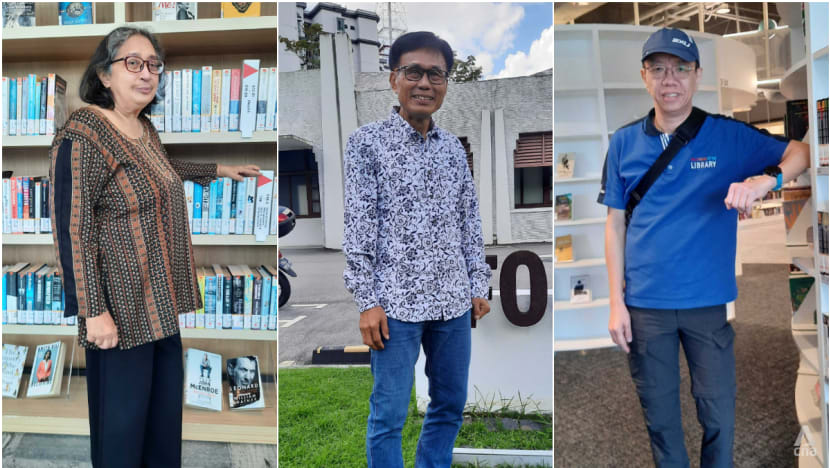
(Left to right) Ms Shamimah Mujtaba, Mr Pok Cheng San, and Mr Chou Tian Foo are National Library Board volunteers who bring diverse experiences to the libraries. (Photos: CNA/Koh Wan Ting)

This audio is generated by an AI tool.
SINGAPORE: Step into Punggol Regional Library on a Saturday and you're likely to catch Mr Chou Tian Foo quietly shelving books on the third floor.
For the past eight months, the 55-year-old has dedicated his time on weekends to volunteering at the public library.
This includes helping children design shoes and invent things through play, or conducting programmes and tours around the facility.
"It's a learning marketplace," said Mr Chou, who is in between jobs.
"Libraries in the past were very quiet. You can be by yourself, right? You will find that the library today is ... a lot noisier. But I think it's a good thing."
The evolution of the library within the past decade - to become more than a quiet place with books - has been witnessed by a growing pool of volunteers.
While these numbers shrank during the COVID-19 pandemic, they are not only recovering but have seen an exponential growth, according to the National Library Board (NLB), which manages 28 public libraries, the National Library of Singapore and the National Archives of Singapore.
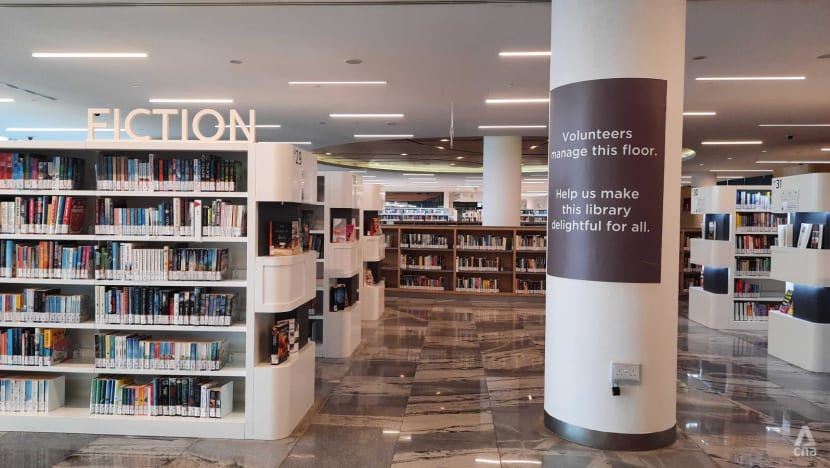
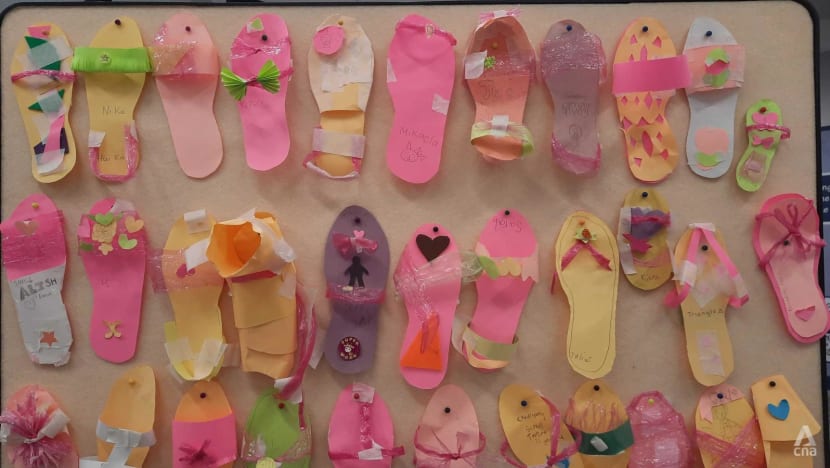
The number of active volunteers has more than doubled from 2,000 in the 2021 financial year to 4,230 in the next, on par with the 4,600 volunteers pre-pandemic. Their ages range from 11 to 79.
NLB wants to ramp up the number to 6,500 by 2026, in line with its Libraries and Archives Blueprint 2025 (LAB25) agenda, which sets out a five-year plan to enhance the library and archives ecosystem.
"Our volunteers play a pivotal role in enhancing the delivery of NLB’s programmes and services," said a spokesperson.
"They play a complementary role in helping us to reach out to more members of the community, and providing additional support to those who require it."
"Volunteers bring with them a diverse experiences and know-how, which in turn can be shared with other patrons to enhance their reading, learning and discovery at NLB’s libraries and archives."
Since the pandemic, NLB has introduced new volunteer roles to beef up its ranks. These include positions to support the disability community.
BRINGING MUSIC AND DANCE TO THE LIBRARY
Where people typically step into the library to borrow books, Ms Shamimah Mujtaba's weekly visits are usually to run three communities which she started from scratch.
The 68-year-old is the brains behind a Singapore literature book club, a social dance club and a ukelele jamming group.
She has been volunteering for eight years now, but was not always into books. After growing up reading as a child, life just got busy, said the retiree.
What brought Ms Shamimah back to the library was her nieces and nephews asking her to get a library card for them to use.
Attendance at her book club now ranges from 10 to 70 people, with numbers swelling to over 200 dialing in via Zoom during the pandemic.
Ms Shamimah recalled one session attended by the late lawyer Adrian Tan to discuss his book The Teenage Textbook.
"It was one of our best meetings. He had us in stitches. He had a very good sense of humour and he's amazing and hilarious so we were laughing throughout the meeting," she said.
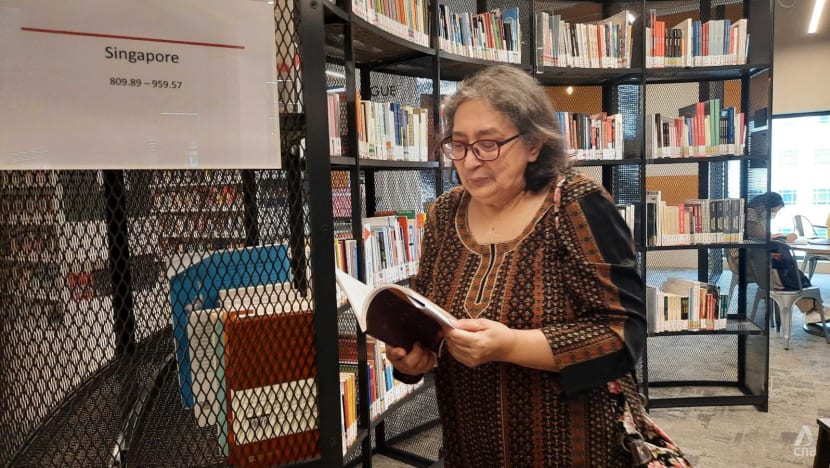
Ms Shamimah's ukelele jamming sessions also take place online and in other libraries besides Tampines Regional Library.
"I realised that to me for a long time I was always thinking of libraries being serious places," she said.
The ukelele sessions made her think otherwise and even attracted people who told her they had never before stepped into a library.
"I see now the number of programmes that the library runs, they are so many and so varied. In fact, I think what we are all short of is time. There's so many programmes I'd like to attend but don't have the time to."
Asked what a library now means to her, Ms Shamimah said: "The library is a happy place for me. It is a place I will go to whenever I have free time.
"You know some people in between when they got to kill time they go shopping. If I have to kill time I will go find a library and sit inside there."
A SNAPSHOT OF SINGAPORE HISTORY
For docent Pok Cheng San, his spare time is best spent going back in time.
The 64-year-old hungers for knowledge of Singapore's history, and for over a decade has spent pored over library resources on the topic - even using a dictionary to get around his lack of English proficiency.
He is just as eager to dish out what he learns to willing ears.
In 2016, Mr Pok first jumped at the chance to share his know-how by being a tour guide at a World War II exhibition at the Former Ford Factory, which is run by the National Archives. He became the exhibition's first Mandarin docent in 2017, after it was revamped and reopened.
He now continues to give tours two Saturdays a month at the historic building where British forces surrendered to the Japanese Army on Feb 15, 1942.
On scheduled weekends, Mr Pok conducts tours in Mandarin that often last beyond the stipulated time of one hour.
Speaking to CNA, he passionately expounded on the importance of the World War II period to Singapore, sometimes deviating into brief lectures on history.
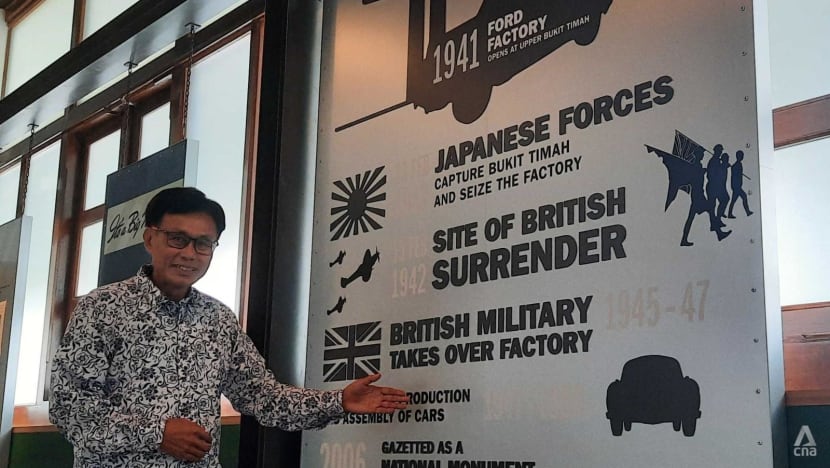
It's a turning point in Singapore's history, he stressed.
"As a docent, we need to use this perspective to tell people that Singapore's success and status as a developing country is not accidental. We went through this painful period and learned that we need to stand up to be the owners of our land."
There are times when Mr Pok finds, to his dismay, nobody showing up for walk-in tours.
"If I go and there is nobody, I will find people and see if they are interested to listen to me," he said gamely.
Mr Pok is also involved in six other volunteer guide roles, which he balances with his job as an executive at the Chin Kang Huay Kuan association - and he would not have it any other way.
"People ask why do you do it? Why do you spend so much time on this? But it's worth it."
LIBRARY FOR LEARNING
Back at Punggol Regional Library, the sounds of children running and stomping across the floor bring a smile to the face of Mr Chou, the volunteer.
He is no stranger to the morning "stampede" of children rushing to grab seats once the library's doors open at 10am.
"There's no way you can stop them. For them it's life or death," he joked.
Similarly, the library holds a significant place in Mr Chou's heart.
"I've always wanted to be part of the library ecosystem. I mean, I love libraries. For me it's like a sanctuary," he said.
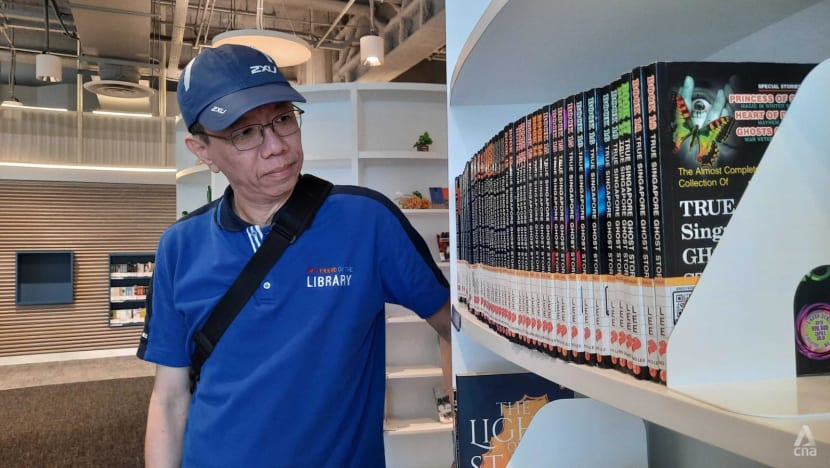
Spurred by a desire to volunteer within his community, Mr Chou decided to give his time to Punggol Regional Library when it officially opened in April.
He left his job in the IT sector around the same time, and started taking courses to become a corporate trainer or educator.
"If you step into a Singapore library today, you will find that people are learning through various means and ways," Mr Chou observed.
Apart from shelving books, he also helps out in a children's activity centre where kids are encouraged to innovate and implement their ideas.
"I like the idea that it gives children a place to proactively learn something, and to fail fast and learn fast," he said. "I felt that if children are exposed to failure, even a small failure, at a young age, they know that failing is part and parcel of learning. I think it's a good place to be."
As libraries evolve, Mr Chou is uncertain if it will continue to need volunteers, with people more than capable of learning on their own now.
For now, he still sees himself as part of - and serving - the library and its wider context of a community.
"As long as I feel that the library is very relevant in this community, the library has a mandate from this community and I can identify myself with it."
















